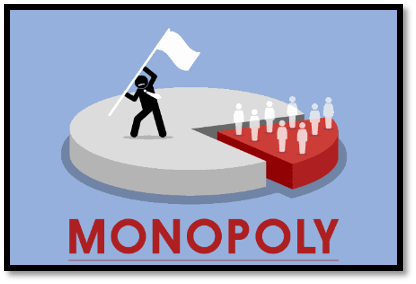Tech Driven Monopolies and the Threat of Innovation

“Uneasy lies the head that wears the crown” – Shakespeare.
Introduction
If you were born in the 1990s you might never have questioned the pervasiveness of companies like Google in the Internet domain. For you, such companies, products, services, and technologies have been ever present and seemingly unassailable.
Yet in the past few months we have seen the emergence of a set of technologies, especially ChatGPT, which have opened the real possibility of a technical and business threat to Google’s near monopoly on Internet search.
Background
For the last 15 years and more, Google has held a market share of over 93% in Internet search [1]. This virtual monopoly drives its nearly $280 Billion annual revenue and has squelched competition. This revenue is largely made up of online advertising. Such market dominance is equivalent to a monopoly which is defined as [2]:
“… a single seller or producer that excludes competition from providing the same product. A monopoly can dictate price changes and creates barriers for competitors to enter the marketplace.” – Hayes, 2022
There are several kinds of monopolies, but in technology, relative advantage is never guaranteed forever. Just as innovation and fast follow-up led Google to its preeminence in the online marketplace, upstart technologies can threaten – and now apparently are threatening – this monopoly advantage almost overnight. These fast-moving developments provide an example to consider when evaluating the functions and impacts of monopolies on society from the perspective of Henry George.
Monopolies: Nothing New Under the Sun
Writing nearly 150 years ago, Henry George (the influential 19th Century thinker and Economist) noted how monopoly can come across as a form of diligent entrepreneurship [3] echoing much rhetoric we hear today praising successful start-up founders. George spoke of how many industrialists of his time started out in life “without a cent.” However, in fact, in creating and leveraging monopolies they found vast wealth:
“Their great fortunes, many of them running up high into the millions, seem to them, and to many others, as the best proofs of the justice of existing social conditions in rewarding prudence, foresight, industry, and thrift; whereas, the truth is that these fortunes are but the gains of monopoly, and are necessarily made at the expense of labor.” – George, 1879
In George’s time monopolies were often built by railway companies who bought up land rights and aggressively bought out or combatted competitors in any way possible. A variety of social benefits were derived from these corporate moves including new technical services, higher productivity, and improved convenience for many. However, the consolidation of wealth and power in a small number of hands led to abuses of wage structures and other labor and market conditions initiating the eventual break up of some of the largest organizations such as Standard Oil, which is the forerunner of today’s Exxon [4].

Recently there was talk about breaking up Google (and other top Internet companies) due to their dominance in the critical digital technology sector of the economy. Ironically, this long dominance is seemingly in danger not through legislation, regulation, or protest but by the very dynamic which built them to their superior position in industry, namely, innovation. While this phenomenon may seem Earth shaking to those without prior experience in the collapse or reinvention of technology-based monopolies, the pattern at play here is not uncommon even if the certainty of the outcomes remain unclear for now.
Grow with Tech, Decline with Tech
The list of examples for monopolistic enterprises based on specific technology innovations is long indeed. So too is the list of companies whose monopolies evaporated due to the next innovation and the completion of the tech lifecycle. The Pennsylvania Railroad – a near monopoly in its markets – was the largest corporation in the world during George’s lifetime and for decades rewarded shareholders with steady dividends. With the rise of the interstate highway system and the post war buildout of the US air travel network the company essentially collapsed in just two years during the mid-1960s.
 Most people born before 1970 remember AT&T (Ma Bell), which entered an agreement to become a regulated monopoly in 1913. This agreement spared AT&T from an anti-trust suit by the US government at that time and ushered in the deployment of “universal service” of telephony nationally. Some argue that the ensuing 70 years provided significant benefits to communications technology within society while others argue that the monopoly agreement stifled competition and innovation. In the end, it was innovation in the form of a competitors’ independent microwave tower-based long-distance service (MCI) that led to the voluntary break-up of the company in 1984.
Most people born before 1970 remember AT&T (Ma Bell), which entered an agreement to become a regulated monopoly in 1913. This agreement spared AT&T from an anti-trust suit by the US government at that time and ushered in the deployment of “universal service” of telephony nationally. Some argue that the ensuing 70 years provided significant benefits to communications technology within society while others argue that the monopoly agreement stifled competition and innovation. In the end, it was innovation in the form of a competitors’ independent microwave tower-based long-distance service (MCI) that led to the voluntary break-up of the company in 1984.
Today we see something similar brewing in the Internet sphere. Longstanding dominant players like Google have been caught off guard by the emergence of new forms of AI driven technologies, particularly generative AI tools and platforms, and are racing to catch up and protect their core business [7]. The technology under the hood of Google’s search is something called the page-rank algorithm [8]. Based on a key insight by the founders, and supported by their novel ranking calculation {Equation 1} along with an underlying software architecture to crawl the web and provide optimal indexing, Google amassed its market share and reaped fortunes for investors.
PR(A) = (1-d) + d (PR(T1)/C(T1) + … + PR(Tn)/C(Tn)) {Equation 1}
According to the New York Times [7], some customers and partners have been seriously looking to replace the default search engine on their products from Google’s to Microsoft’s Bing which has now integrated ChatGPT. This followed Microsoft’s major investment in OpenAI, ChatGPT’s developer, thereby outmaneuvering Google on their home field. This twist has apparently led to some level of “panic” within Google itself:
“A.I. competitors like the new Bing are quickly becoming the most serious threat to Google’s search business in 25 years, and in response, Google is racing to build an all-new search engine powered by the technology.”– Grant, NYT, 2023

In retrospect, one can now question the long-term vision of the research direction of Google and its parent company Alphabet. While they were chasing moonshots, such as self-driving cars, the emergence of a serious threat to their core business emerged practically overnight (although like most overnight sensations this one took decades to create). Essentially, innovation is a double-edged sword. You can build a fantastic franchise based on a given technology but searching for the next winner is not always assured.
Looking Ahead
Predicting the future is something even ChatGPT cannot do reliably. Nevertheless, past results sometimes help narrow probable events in cases of monopolies under threat by emerging innovations. For many a Google fan, seeing a favorite set of tools disrupted might not be a welcome prospect. But indeed there is a precedent for this in the concept of “creative destruction”. That is, when excesses in the marketplace are corrected, some elements of the economy must fall.
Since the OpenAI train has already left the station a come from behind win may prove to be a tough slog and typically a long one for competitors. Google does not have the first mover advantage here. Also, the infrastructure, domain understanding, talent, and momentum belong to the competitor who is continuing to advance their state of the art every day. Thus, Google (and others) are trying to catch a moving target. Finally, they may even have to kill their prized golden goose (i.e., the traditional page-rank based search engine), upending existing revenue streams, to get to the next level. However, a well-funded, organized, and sophisticated technical organization like Google can certainly rise to the challenge.
From the perspective of what this all could mean for the rest of us, there has certainly been much discussion of how such AI tools could put some people out of work, introduce broad plagiarism, and essentially destroy our entire civilization. These claims of technology upending lives and social existence are not new and tend to come around with the introduction of major advances. Over time, we have learned to recognize that each technology has a built-in duality of providing both benefits and drawbacks.
In the current case, it is too early to tell if a monopoly like Google’s might be replaced by a new monopoly driven by such tools as ChatGPT and profited from by a prior monopoly player, namely Microsoft, or some other player(s). In the end we are left with the question – what of monopoly, whether tech based in nature or based in nature itself. For Henry George, there was a natural monopoly of “land”, which he interpreted as nature’s bounty to be shared by all. Might we then train the next generation of AI tools to produce laws and regulations which might more equitably provide for society? Or is that scary as well?

References
- “Search Engine Market Share Worldwide – March 2023”, StatCounter: GlobalStats, viewed April 28, 2023.
- Hayes, Adam, “What Is a Monopoly? Types, Regulations, and Impact on Markets”, Investopedia, August 02, 2022
- George, Henry, Progress and Poverty: An Inquiry into the Cause of Industrial Depressions and of Increase of Want with Increase of Wealth. The Remedy., D. Appleton and Company, New York, 1879.
- “Standard Oil’s Monopoly: Topics in Chronicling America”, Research Guides: Library of Congress, viewed 4/30/2023.
- “The Railroad in Pennsylvania”, ExplorePAhistory.com, viewed April 30, 2023.
- “Milestones in AT&T History: History of AT&T”, Internet Archive Wayback Machine, December 18, 2005.
- Grant, Nico, “Google Devising Radical Search Changes to Beat Back A.I. Rivals”, The New York Times, April 16, 2023.
- Brin, Sergey, & Page, Lawrence, “The Anatomy of a Large-Scale Hypertextual Web Search Engine”, Stanford University, 1998, http://infolab.stanford.edu/~backrub/google.html.



Leave a Reply
Want to join the discussion?Feel free to contribute!